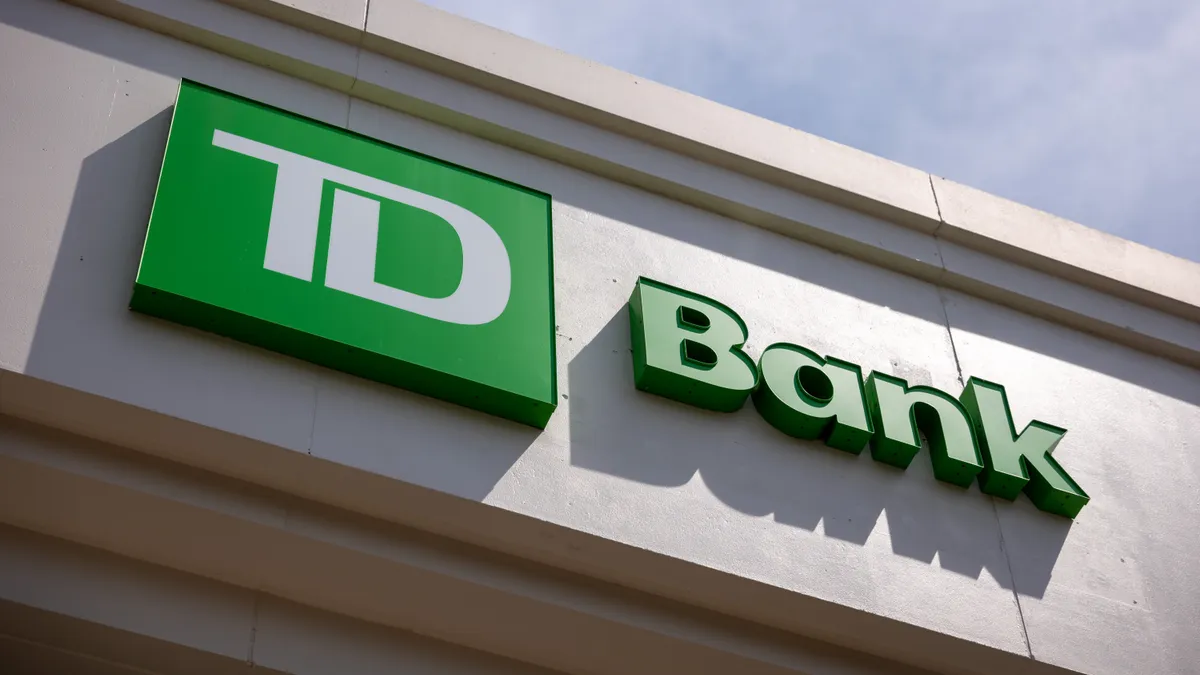Dive Brief:
- TD set aside an additional $2.6 billion last quarter for expected penalties related to U.S. anti-money laundering probes. That’s on top of the $450 million the bank appropriated in April.
- All told, the bank provisioned $3.57 billion, representing TD’s current estimate of the total fines to be paid related to AML matters, TD CEO Bharat Masrani said Thursday during a quarterly earnings call.
- The bank expects “a global resolution” on the AML matters by the end of this year, he said. “While we are not through the tunnel yet, we can see the light at the end of this journey,” Masrani said.
Dive Insight:
The AML woes of Canada’s second-largest lender stem from an alleged scheme through which traffickers used the bank to launder at least $653 million tied to the drug fentanyl, The Wall Street Journal reported in May. The Justice Department has said criminals bribed bank employees, and TD is facing both civil and criminal investigations into its U.S. AML program.
Prior to the call’s question-and-answer session, Masrani noted the bank has shared all of the AML-related information it can at the moment, and suggested analysts stick to questions on the company’s quarterly earnings. That request largely went unheeded.
Executives were peppered with related questions, including on the possibility of regulators imposing an asset cap on the bank’s U.S. business. Masrani said he couldn’t speculate as the bank is in negotiations related to the investigation. The bank warned it could face non-monetary penalties related to the probe, and analysts have expressed concern the issues could hamper the bank’s ability to grow in the U.S.
TD disclosed Wednesday that it sold 40.5 million shares of Charles Schwab stock, dropping the bank’s ownership stake in Schwab from 12.3% to 10.1%. Masrani credited the bank’s desire to carry more capital than may be necessary.
When an analyst probed further, asking if that capital stance reflects that the bank believes AML penalties could be even larger than what’s been provisioned, Masrani said, “Our current estimate is that this is the amount it will take to move forward.”
Beyond money set aside for expected penalties, the bank has spent C$500 million ($366 million) to improve its anti-money laundering program and continues to put more into the effort. TD has added roughly 500 employees, including former regulatory or law enforcement agency staffers, to support recent modifications, said Leo Salom, the bank’s U.S. CEO.
The bank has also made data and technology investments to enable transaction monitoring and implemented cross-functional procedures for preventing, detecting and reporting suspicious activity, Masrani said.
“This is a priority,” Masrani said. “Our U.S. business is an important part of the bank and of our future.”
AML program-related expenses are expected to peak in early 2025, Salom said. Executives expect fiscal 2024 expense growth to be in the high single-digit percentage points, reflecting larger investments in risk and control infrastructure, as well as litigation, CFO Kelvin Tran noted.
TD’s quarterly expenses soared 50% year over year, to $11 billion, due to the AML provision, higher spending on remediation and staffing, restructuring charges and a fee related to the bank’s scrapped acquisition of First Horizon.
For the quarter ended July 31, the bank reported a loss of $181 million, compared to net income of $2.9 billion in the year-earlier period, according to quarterly earnings materials.
The bank also said it completed its restructuring program, which reduced headcount by 3% and is expected to generate about $800 million in annual cost savings.












